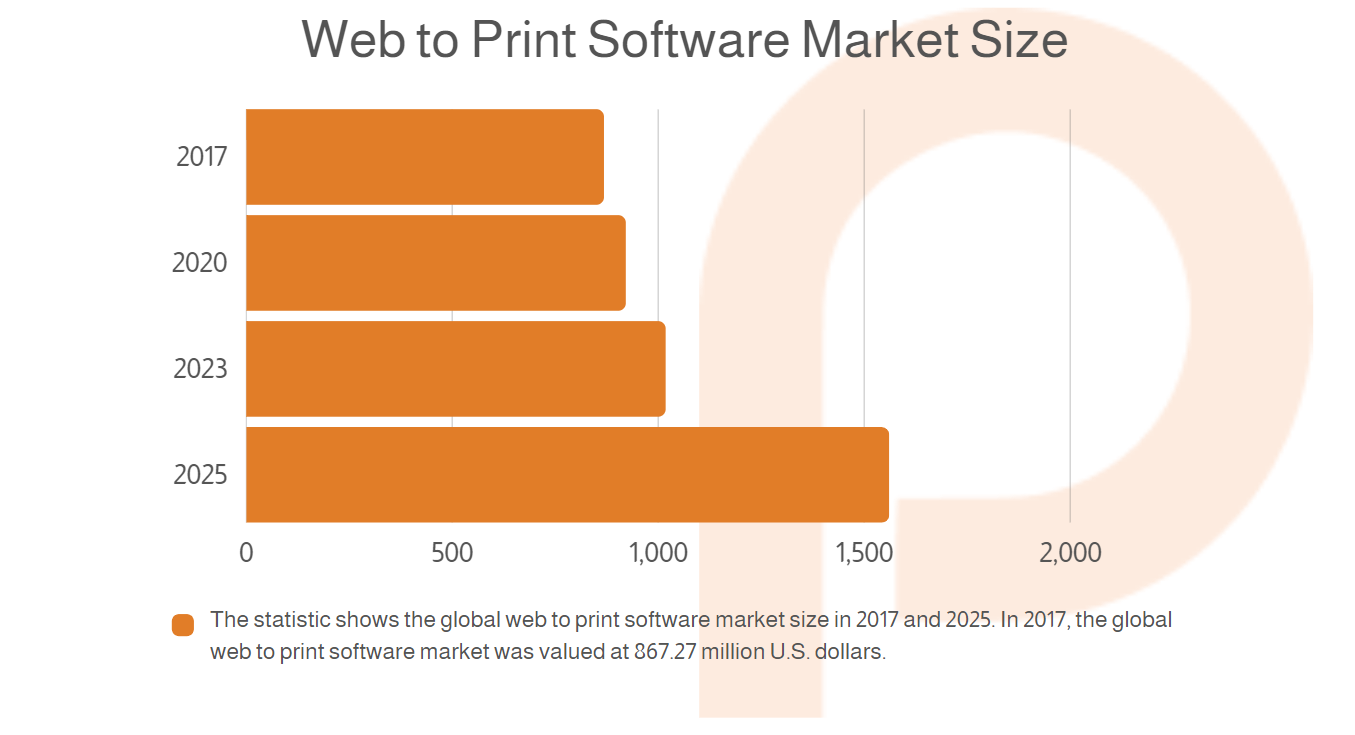To outsource or not to, that is the question. Discover the impact of the recession on outsourcing and its potential benefits for your company.
Customers are setting high standards for today’s printing market. When it comes to online services, they want the best experience possible. To achieve the finest results, rewarding feedback, and clients’ loyalty, businesses must be agile, offering shopfronts that adapt to their customers’ changing needs and desires while standing out in a crowded market. Thanks to the global switch to digital it is possible. Web-to-print solutions unite individual customers looking for unique designs, professional designers wishing to sell their services, resellers, and printing houses working with print products on a daily basis. To know more about the e-commerce potential for print goods we gathered only valuable information.
What is Web2Print
The statistic shows the global web-to-print software market size in 2017 and 2025. In 2017, the global web-to-print software market was valued at 867.27 million U.S. dollars and is expected to reach 1560.39 million USD by the end of 2025. The web-to-print technology uses the internet for printing. By using these online print services, customers can order, manage, and adjust products they would like to print. This technology is also known as W2P or “remote publishing.” With access to the platform or application, you can receive your order locally instead of waiting for shipping. W2P requires minimum interaction with the customer, as they manage all the design points by themselves. Managers approve and fix minor imperfections if such might occur. In addition, web-to-print software allows you to engage with users 24/7, as an online platform remains open to customers anytime. Clients have the option to upload their own unique content for automated print production. The web-to-print process streamlines print production, making web-to-print printing both affordable and efficient.

Web-to-print software solutions
Once you’ve settled with the concept of your web-to-print application you might face an eternal dilemma on whether it is better to develop it from scratch or use a ready-made product. Choosing one of these options will determine what kind of variable data printing and digital printing software you’ll use to achieve your web2print goals. Moreover, it will reduce the amount of work you have to do and the overall cost of your web-to-print business.
Building your own web-to-print storefront is a bold decision requiring thoughtful consideration and weighing potential pros and cons. Web-to-print development means your full integration in the process. You discuss customers’ journey, the UI/UX of the application platform, and its technical points. The solution is 100% tailored to your vision and requirements. You have full access to the development process since engineers present their work results at all stages, and a solution can be updated whenever you need it. You have complete freedom of action limited only by your requirements. Yet, on the other side, you must acknowledge that this is not a cheap pleasure. Since the development process is lasting and adding extra features takes time to create and test them. In addition, if your technical knowledge is not that wide, you might not be able to check it from within and ensure this part to tech leads or delivery managers. Experienced software vendors face these factors daily, mitigating them and providing clients with the best solutions, and optimizing their expenses.
If you are considering adopting a ready-made solution, you may be tempted by its simplicity of use and rapid app deployment on the market. Following customers’ needs and requirements, such platforms have a vast pool of proposals to achieve the best customer experience. These solutions aim to predict buyers’ habits and connect them with demanding products. Alas, there are also downfalls. Despite the relatively low price, a proposed solution might be different from what you expected. It might not cover your requirements and not be customized. If you didn’t have a previous experience in its utilization, you might spend extra time learning and figuring out what goes where. As a result, you might spend equal funds on non-perfect solutions.

Shop API
With a web-to-print design, customers can print and sell their goods globally, and by integrating it with an e-commerce website, they can expand their reach through customized offers and unique templates. Using a web-to-print platform as your provider can integrate it with popular e-commerce platforms such as BigCommerce, eBay, Etsy, PrestaShop, Shopify, Wix, WooCommerce, Magento, Opencart, Walmart, and Squarespace. It only requires creating an account on a web-to-print platform, connecting your shop store from provided platforms, or creating a new account and providing or creating your goods. At the same time, the provider will fully handle printing and shipping.
Print API
To boost your web-to-print product, whether it is a single-product or an omnichannel marketing platform, by integrating the Application Programming Interface (API), you open nearly limitless opportunities for your business. Web APIs are interfaces that allow data to be exchanged between different applications. If you are running an e-commerce store, it is much easier and faster to connect the API of a shipping company and receive real-time pricing data instead of searching and adding it to your database. Similarly, it works with payment providers and social applications. When it comes to print, its potential rises equivalently. Whether you are a web-to-print company or a publisher that needs extra features you are lacking, web API connects you with the whole print network. For example, if you need to print books for a customer and your website does not have printing output, an API will connect you with the next available print facility enabling printing and delivery of your goods in days, with no need to spend months on interrogations and negotiations.
Depending on your request, you can receive these products separately or integrate them into one fully-functional platform with a unique storefront with goods, a backend financial service, which includes payment and order, and a print API that connects you with printing houses. Altogether they provide an end-to-end process of web-to-print process.

Final Word
The print market keeps growing, opening new niches and possibilities for business as software development company Proffiz has solid expertise in the printing domain. Over 20% of our current clients trust us with their print solutions .Whether it is a B2C, B2B, or custom design product, you can be sure of its high quality, agility, and efficiency. Whether you are a big enterprise, SME, or a newborn startup, you can always rely on our experienced tech experts and management. You can start our cooperation with one click . Turn your business plan into reality.

RIP software is software that processes digital images to optimize them for printing. To learn more about it, read this article.

What is prepress software, and how it affects the print process? Read here.




